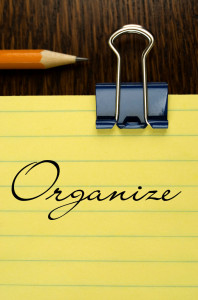Week Three: Principles of Organization
Last week we discussed goal setting and the value or importance of goals and some ideas on how to do the tasks that are most important in order to achieve goal success. This week we are going to work on how to get and stay organized in order to stay focused on your goals and the important tasks that need to be accomplished in order to achieve goal success.
There are three basic principles of organization:
- 1. Organize to support your goals.
- 2. Designate a place for everything and keep everything in its place.
- 3. Honor your personal style.
When you organize to support your goals, you improve and maintain order. Think about one area of your workspace right now. It could be your desk, your credenza, the floor or your workspace. Does this area support your goals?
Clearing Clutter and Creating Order
Clutter is emotionally draining and causes delays, frustrations, and stress. Facing a mess every day can make you feel irritable and tired before you even begin the day. Experts estimate that we spend about 150 hours a year looking for misplaced information and items. That’s about one full month of lost productivity.
Some people have a hard time throwing things out. What’s the worst thing that can happen if you throw out an item and need it later?
Procrastination
Sometimes we just don’t want to do something because it’s an activity we don’t enjoy or it’s one that bores us. Name some of the things you do not like to do.
Some things just have to be done, and whether we like it or not, they have to be done by us. We have to go to the dentist, and doctor for routine exams to keep us healthy. We have to file and pay taxes.
In these cases where we have to do things we don’t want to do, it’s best to make an appointment with yourself, set aside time on your calendar to get it done and just do it! Tackle a little bit of the task each day. It is best if you target the most unpleasant thing first and get it out of the way. Once it’s done you will usually feel a whole lot better.
To-Do List
Using a daily to-do list helps you keep track of things that need your attention and don’t need to be scheduled on your calendar. Keep your to-do list manageable, less than 7 items on it. Do not add to your to-do list until you scratch items off because they are done or you have decided not to do them. You can even take your daily to-do-list on step further by listing several items on the list and then prioritizing them into an A, B, and C order. “A” items need to get done ASAP; “B” items need to get done within the next two or three days; “C” items need to be done by the end of the week. This allows you to keep your to-do-list up to date without having to re-write it. Work smarter not harder!
Energy Patterns – Checklist for morning people and night people
Your energy pattern will dictate what tasks on your to-do-list get done in the morning or afternoon. Here are some ideas:
- Schedule your day to maximize your peak energy hours using your to-do-list as your organizing tool.
- Set and adhere to a regular wake-up time.
- Get exposure to sunlight within fifteen minutes of awakening. Sunlight energizes your body and starts your internal clock ticking.
- If you feel your energy lagging during the day, go outside or find a window and stand in the sunlight for a few minutes.
- Schedule creative activities and activities that require intense concentration for times when your energy is high, usually the three or four hours after awakening.
- Exercise regularly. Schedule it!
- Schedule meetings for 11AM, when most people are alert and reasoning skills are good. Scheduling them just before lunch also means that you are more likely to end on time. Avoid meetings right after lunch.
- Eating protein helps raise alertness. Carbohydrates contribute to relaxation. Plan lunch and dinner based on what you need to do afterward. If you have an important meeting or presentation, order chicken or fish and avoid pasta.
- Do not skip meals. Hunger can adversely affect performance and create feelings of stress and anxiety.
- Schedule routine and/or repetitive activities for the hour right after lunch since energy will be lowest at this time.
- Just before heading home, plan the next day. Edit or write up your to-do-list for the next day.
- Late afternoon is best for exercising since coordination is good at this time. Exercising later in the day also contributed to restfulness and a good night’s sleep.
- A snack of carbohydrates before bedtime can induce sleepiness.
- Avoid alcohol and caffeine just before bedtime.
- Go to bed the same time every night to keep your internal clock on time.
